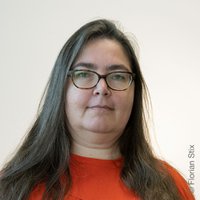Digital Product Data for More Sustainability
Increasing Sustainability by Putting Digital Product Passports into Practice

In a series of projects, the St. Pölten University of Applied Sciences explores how digital product passports can be implemented, and which sustainability effects they may have. The projects address the areas of plastics, electronics, and food.
Digital product passports form the data basis for a sustainable circular economy because they make it possible to track products along the entire supply chain. This leads to more product safety, makes production more efficient, and reduces negative environmental impacts.
“The effective integration and management of environmental data on products’ raw materials, composition, and fabrication is a basic requirement for the establishment of a circular economy and the business models it inspires”, says Tassilo Pellegrini, Co-Head of the St. Pölten UAS’ Institute for Innovation Systems which conducts research on this topic.
Sustainable Business Model for the Electronics Industry
In the project ECO-TCO, for example, Pellegrini explores together with Siemens how data from a digital product passport could be used for circular and ecologically sustainable electronic products and for comparing the life-cycle costs of different product variants.
“With our project, we examine ways of making data from a digital product passport economically useful and turning the sustainability principle into a fundamental pillar of future business models in the electronics industry”, summarises Tassilo Pellegrini. The law firm “Höhne, In der Maur & Partner“ is a partner in the project.
Improving Plastics Recycling
The study DPP4PLASTICS of the St. Pölten UAS researches the technical, legal, and organisational implications of a digital product passport for companies that produce and process plastics.
In order to promote the transition towards a sustainable circular economy, disposal companies and waste-processing companies need precise information about the type and composition of the respective synthetic material. This is to ensure that recycling leads to high-quality processed plastics waste that can compete with new materials.
In addition to cleanly separated material flows, this takes a sufficient amount and quality of recycled plastics at a reasonable market price. This is the only way of meeting legally prescribed recycling quotas and making recycled materials competitive as alternatives to primary materials.
The St. Pölten UAS carries out the project in cooperation with the Transfercenter für Kunststofftechnik GmbH (TCKT) and the law firm “Höhne, In der Maur & Partner“.
Digital Product Passport for the Soybean
Moreover, the St. Pölten UAS coordinates a research project developing a prototype for a digital product passport for food supply chains based on the example of the soybean.
“There are multiple obstacles to overcome in the practical implementation of a digital product passport. For one thing, the supply chains’ complexity is challenging, and then we have to ensure that the various technical systems and organisations can communicate with each other”, explains project manager Alexandra Anderluh from the Carl Ritter von Ghega Institute for Integrated Mobility Research at the St. Pölten UAS.
Project ECO-TCO
The project ECO-TCO receives funding from the FFG within the framework of the “Digital Technologies 2023” programme. Partners are Siemens AG Austria and the law firm “Höhne, In der Maur & Partner”.
Project DPP4PLASTICS
The project DPP4PLASTICS is also funded by the FFG within the framework of the “Digital Technologies 2023” programme. Partners are the Transfercenter für Kunststofftechnik GmbH and the law firm “Höhne, In der Maur & Partner“.
Project DPP4FOOD – Digital Product Passport for the Food Industry
The project DPP4FOOD receives funding from the Lower Austrian Gesellschaft für Forschungsförderung (GFF). Project partners are Sojarei Vollwertkost GmbH, Bio Agrar Service, Biogast, and FH Campus Wien.
Project DPP4ALL
In the already concluded research project DPP4ALL, the St. Pölten UAS’ Institute for Innovation Systems investigated the technical, legal, and organisational requirements for a digital product passport. The project received funding from the Federal Ministry for Climate Action, Environment, Energy, Mobility, Innovation and Technology (BMK).

FH-Prof. Mag. Dr. Tassilo Pellegrini
Head of Research InstituteInstitute for Innovation Systems Department of Digital Business and Innovation

Dr. Alexandra Anderluh
Senior Researcher Carl Ritter von Ghega Institute for Integrated Mobility Research Department of Rail Technology and Mobility
Mag. Mark Hammer
Section Head PressMarketing and Communications